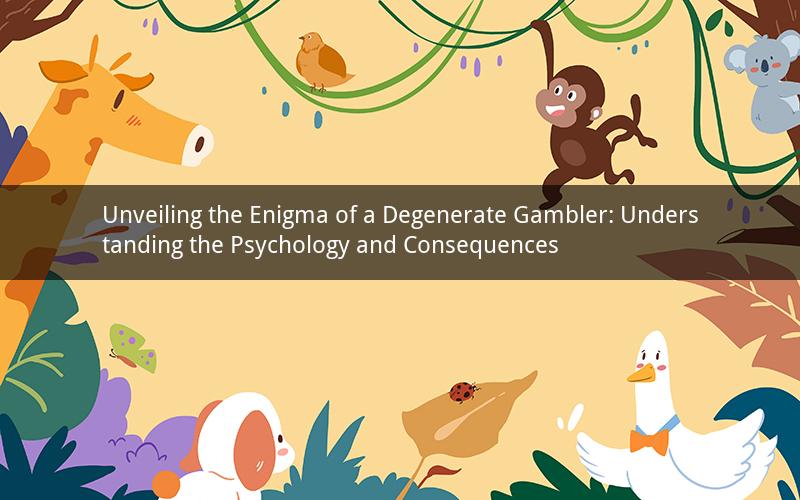
Introduction:
The term "degenerate gambler" evokes a sense of intrigue and confusion. It refers to an individual who has developed an unhealthy and uncontrollable obsession with gambling. This article delves into the meaning behind the term, exploring the psychological aspects, consequences, and the challenges faced by degenerate gamblers.
1. What is a Degenerate Gambler?
A degenerate gambler is someone who has crossed the line from recreational gambling to a compulsive and harmful addiction. Unlike casual gamblers who enjoy the thrill of the game, degenerate gamblers become consumed by the desire to win, often leading to devastating consequences. They may engage in risky behaviors, neglect their responsibilities, and even resort to illegal activities to sustain their gambling habits.
2. Psychological Aspects of a Degenerate Gambler
The psychological factors contributing to degenerate gambling are complex. Several key elements play a role in the development of this addiction:
a. Psychological Factors:
- Low self-esteem: Degenerate gamblers often suffer from low self-esteem, leading them to seek validation through gambling.
- Impulsivity: A lack of impulse control makes it difficult for degenerate gamblers to resist the urge to gamble, even when it is detrimental to their well-being.
- Emotional Distress: Many degenerate gamblers turn to gambling as a means to cope with emotional pain or stress.
b. Genetic Factors:
Research suggests that genetics may play a role in the susceptibility to gambling addiction. Certain individuals may inherit a predisposition towards addictive behaviors, including gambling.
c. Environmental Factors:
The presence of gambling opportunities, exposure to gambling-related media, and social influences can contribute to the development of degenerate gambling.
3. Consequences of Degenerate Gambling
The consequences of degenerate gambling are far-reaching and can impact various aspects of an individual's life:
a. Financial Ruin:
One of the most immediate consequences of degenerate gambling is financial ruin. Gamblers may exhaust their savings, accumulate debt, and even resort to stealing to fund their addiction.
b. Relationship Strain:
Gambling addiction can strain relationships with family, friends, and loved ones. Betrayal, secrecy, and neglect often lead to broken trust and emotional pain.
c. Legal Problems:
Illegal activities may become necessary for degenerate gamblers to sustain their addiction. This can lead to legal consequences, including fines, imprisonment, and a criminal record.
d. Health Issues:
The stress and anxiety associated with degenerate gambling can lead to physical and mental health issues. These may include depression, anxiety, insomnia, and other related conditions.
4. Treatment and Support for Degenerate Gamblers
Recognizing the need for help is the first step towards recovery for a degenerate gambler. Various treatment options are available, including:
a. Therapy:
Cognitive-behavioral therapy (CBT) is often used to address the psychological aspects of degenerate gambling. It helps individuals develop healthier coping mechanisms and overcome addictive behaviors.
b. Support Groups:
Support groups, such as Gamblers Anonymous, provide a sense of community and mutual support for individuals struggling with gambling addiction.
c. Financial Counseling:
Financial counseling can help degenerate gamblers manage their debt and develop a plan for financial recovery.
5. Questions and Answers
Question 1: Can someone overcome a degenerate gambling addiction?
Answer: Yes, with the right support and treatment, individuals can overcome a degenerate gambling addiction. Recovery requires dedication, perseverance, and a willingness to change.
Question 2: Is degenerate gambling a form of mental illness?
Answer: Yes, degenerate gambling is considered a mental illness, specifically an addictive disorder. It is classified as a substance-related and addictive disorders in the Diagnostic and Statistical Manual of Mental Disorders (DSM-5).
Question 3: Can a degenerate gambler recover without professional help?
Answer: While it is possible for some individuals to recover on their own, seeking professional help significantly increases the chances of successful recovery. Therapy, support groups, and financial counseling can provide essential tools and resources.
Question 4: How can I help a loved one struggling with degenerate gambling?
Answer: Encourage your loved one to seek help, offer support without enabling their addiction, and be patient throughout the recovery process. Educate yourself about degenerate gambling to better understand the challenges faced by your loved one.
Question 5: Is there a cure for degenerate gambling?
Answer: There is no definitive cure for degenerate gambling, but it can be effectively managed through treatment and support. Recovery is a lifelong journey that requires continuous effort and commitment.
Conclusion:
Understanding the concept of a degenerate gambler is crucial in addressing the challenges faced by individuals struggling with this addiction. By recognizing the psychological aspects, consequences, and available treatments, we can work towards creating a supportive environment for those affected by degenerate gambling.